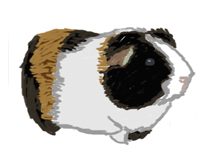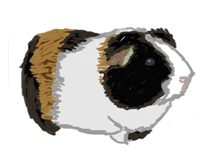

Dog Loving, An Owner’s Manual for the Commitment-Phobic, V.1: The Guinea Pig
As a struggling 20-something in today’s society, I am torn between competing ideas of what I should be striving for in my current stage in life. The desire to put down roots, commit, and resign myself to Responsibility is terrifying (I can’t even commit to buying furniture, thus, my clothes are routinely sorted into piles on my floor).
As a struggling writer in today’s society, ideas for novels I’m working on are continuously zipping through my mind, and every now and again, one takes root, like a dandelion seed on the wind, finding a home, or spinning into a spider’s web and rotting. Anyone who writes knows that the process isn’t exactly painless.
And every now and again, these two ideas, the competing ideals of “commit to a relationship/apartment/piece of furniture” and “commit to a novel idea” combine in a shocking and somewhat preordained sort of way.
That is how we arrive at the book Guinea Dog by Patrick Jennings.
Since the death of my childhood/teenagedhood/young adulthood dog in early March, I have struggled with the need to find some source of emotional connection to help recover my balance. I need a dog. I can’t have a dog at the moment (future blog post topic: Dog-Friendly Housing and the Lackthereof—or perhaps Dog Loving: An Owner’s Manual for the Commitment-Phobic), and so I have settled on the next best thing: A guinea pig.
Now, that might seem an incongruous idea, and rather random, but hear me out. These are the reasons why a guinea pig would be an idea Almost Dog:
It’s not a cat. I’ve done the Cat As Replacement Dog route before, and it didn’t turn out well. It didn’t turn out spectacularly badly either, but in the end, my cats were still cats and I was still missing my dog, and none of us were happy. Except the cats. They were anti-social little maniacs with far too many toes who delighted in finding new ways to make me regret thinking that a cat could ever be a dog stand-in. They were right. (Now, that’s not to say that I didn’t like my cats. I just didn’t like cats in general. My cats were amazing. Off-balance and somewhat insane, but my dog was a little neurotic, emotionally unbalanced, prone to bouts of depression, and the cichlid I had once enjoyed digging graves and filling them with fishy victims. My family does not have normal pets.)
Guinea pigs are low-maintenance but still furry, cute, and I’m told they have personalities. I cannot confirm, as my sole guinea pig experience comes from crouching with my sister in front of a cage containing one and laughing like crazy at it’s adorable, chirpy noises.
I’m sure you can teach guinea pigs tricks, like rolling over, playing dead, shaking paws, barking… Okay, maybe not the barking.
Most importantly, they don’t have those creepy little naked stubby tails like hamsters.
Anyway, this idea has taken root in my mind, and I thought to myself, “Egads! That’s brilliant! I shall adopt a guinea pig, which is low-maintenance, low-commitment, yet high on emotional rewards, teach it dog tricks, call it Puppy, love it and feed it and cuddle it and carry it in my purse to work every day, even though the Office Dogs will probably try to eat it, and my needs to settle and become a functioning member of society shall be met! And best of all, I shall write a book about it! Who wouldn’t want to read about the trials and tribulations of trying to teach a guinea pig to be a suitable dog?”
That was about the time when I received a package on my desk containing the review copy of Guinea Dog by Patrick Jennings, a novel which promises to deliver a story about a boy named Rufus, who “has been begging for a dog, but his grouchy dad refuses to budge.” Luckily for Rufus, “[his] mom thinks she has the perfect solution and brings home a guinea pig.”
Apparently it’s been done. I ought to have stuck with the hamster idea, but those tails really do freak me out.
(On the upside, I am now tremendously excited to read this book and review it for the book club. Any book about a guinea pig who thinks it’s a dog is fine by me! As for my own book, it’s back to the drawing board for me. But that’s kind of the best part, isn’t it? Maybe that’s the commitment-phobic part of me talking.)
Join the newsletter and never miss out on dog content again!
"*" indicates required fields
By clicking the arrow, you agree to our web Terms of Use and Privacy & Cookie Policy. Easy unsubscribe links are provided in every email.